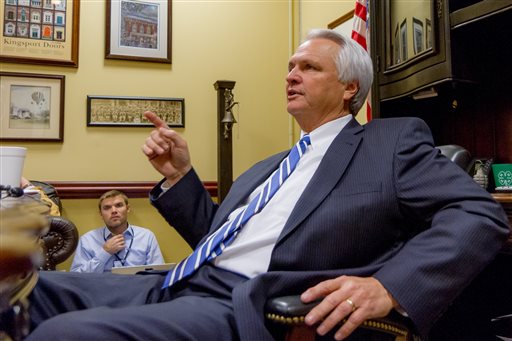Lawmakers will decide soon whether Tennessee becomes the 14th state to allow taxpayer money to pay for tuition at private K-12 schools.
The voucher issue is one of the most heated facing the General Assembly. Passage is not guaranteed but legislative leaders say the fight is over how expansive a voucher program will be -- who's eligible and who's not -- just as it was last year when a voucher bill failed over fierce skirmishing about which students should qualify.
Vouchers let parents use state and local taxpayer money dedicated to public schools on a per-pupil basis to pay tuition at private schools of their choice. The National Conference of State Legislatures says 13 states plus the District of Columbia have some form of state-funded voucher programs, including Florida, Georgia, Louisiana, Mississippi and North Carolina in the South.
This year's legislative battle starts where last year's ended, with a bill proposed by Gov. Bill Haslam to phase in a limited program over three years.
Haslam's plan -- based on recommendations of a commission he appointed in 2012 -- limited vouchers in the first year to 5,000 students attending schools ranked in the bottom 5 percent in performance. That would include about 83 schools, mostly in Shelby, Davidson, Hamilton and Knox counties. Vouchers could go only to children who qualify for free or discounted school lunches because of low income (about $43,000 for a family of four). It increases the number eligible to 20,000 in its third year and thereafter until the Legislature expands it.
But the governor withdrew his bill when proponents of a bigger program tried to amend it to raise the income ceiling to 175 percent of poverty level (about $75,000 for a family of four). They wanted to double the number of vouchers available the first year to 10,000 and strike all limits in the third year and thereafter. Proponents also wanted to remove the requirement that students previously attend a failing school to qualify, and to make home-schoolers and students already in private schools eligible.
Haslam will announce soon whether he's willing to expand his 2013 plan.
"We've been more in favor of a limited approach, for low-income kids in low-performing schools, as a way to test and see how it does and what kind of difference it makes," he said when he last publicly addressed the issue, in November. "We haven't made a final decision but in terms of how we think a voucher should work, I don't think we've changed our minds."
State Sen. Brian Kelsey, R-Germantown, a voucher proponent, said last week he's hopeful for a compromise that limits vouchers to low-income children regardless of the schools they currently attend.
"I've never been opposed to placing caps in the bill. My emphasis is on the low-income children and (a compromise proposal last year) would have kept the governor's caps in place and kept income eligibility at free and reduced-price lunch but would have opened the program to schools other than the bottom 5 percent of schools if the caps were not reached. I was open to that concept last year and I remain open to it this year," Kelsey said.
Senate leaders expect a somewhat more expansive bill, while House leaders favor the governor's limited approach that won approval in the House Education Committee last year.
Voucher advocacy groups that spent $800,000 on TV ads promoting vouchers during last year's session and gave hundreds of thousands more to legislators' campaigns are active again. Opposition is from Democratic leaders, public school boards and administrators, and the Tennessee Education Association.
"Draining public money from schools is simply bad policy. Vouchers have never been proven to increase student outcomes; in fact, there is growing evidence that it doesn't work," said Tennessee Education Association lobbyist Jim Wrye. "Vouchers continue to have problems with accountability across the country."

